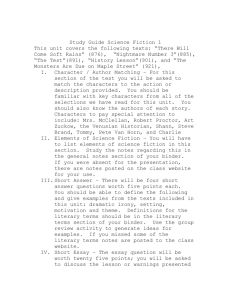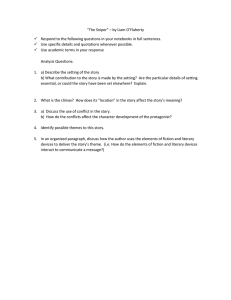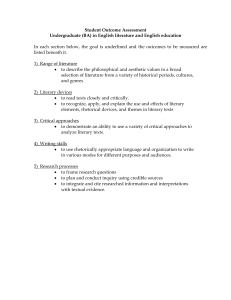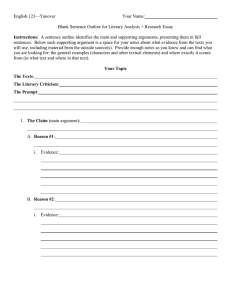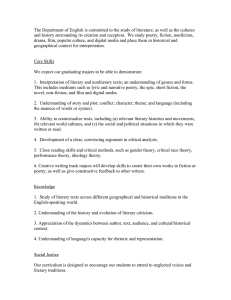ENL/WMS 246: Women Writers Course Description: Additional course information:
advertisement
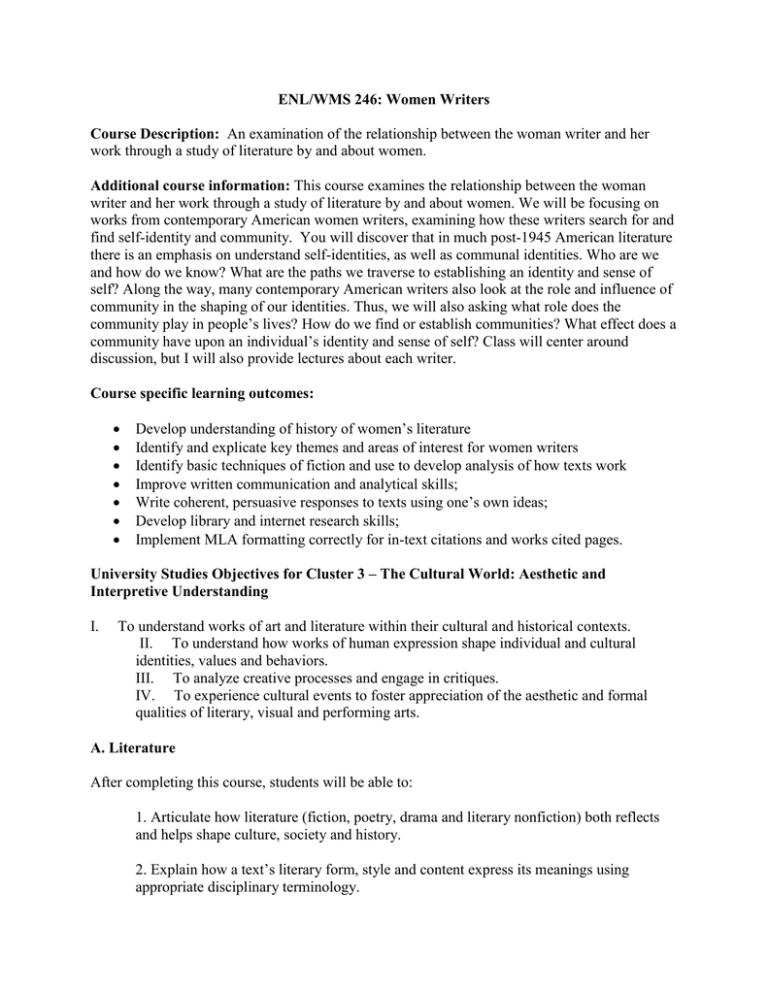
ENL/WMS 246: Women Writers Course Description: An examination of the relationship between the woman writer and her work through a study of literature by and about women. Additional course information: This course examines the relationship between the woman writer and her work through a study of literature by and about women. We will be focusing on works from contemporary American women writers, examining how these writers search for and find self-identity and community. You will discover that in much post-1945 American literature there is an emphasis on understand self-identities, as well as communal identities. Who are we and how do we know? What are the paths we traverse to establishing an identity and sense of self? Along the way, many contemporary American writers also look at the role and influence of community in the shaping of our identities. Thus, we will also asking what role does the community play in people’s lives? How do we find or establish communities? What effect does a community have upon an individual’s identity and sense of self? Class will center around discussion, but I will also provide lectures about each writer. Course specific learning outcomes: Develop understanding of history of women’s literature Identify and explicate key themes and areas of interest for women writers Identify basic techniques of fiction and use to develop analysis of how texts work Improve written communication and analytical skills; Write coherent, persuasive responses to texts using one’s own ideas; Develop library and internet research skills; Implement MLA formatting correctly for in-text citations and works cited pages. University Studies Objectives for Cluster 3 – The Cultural World: Aesthetic and Interpretive Understanding I. To understand works of art and literature within their cultural and historical contexts. II. To understand how works of human expression shape individual and cultural identities, values and behaviors. III. To analyze creative processes and engage in critiques. IV. To experience cultural events to foster appreciation of the aesthetic and formal qualities of literary, visual and performing arts. A. Literature After completing this course, students will be able to: 1. Articulate how literature (fiction, poetry, drama and literary nonfiction) both reflects and helps shape culture, society and history. 2. Explain how a text’s literary form, style and content express its meanings using appropriate disciplinary terminology. 3. Evaluate the rhetorical and contextual elements of ideas presented by literary texts and respond to them critically and analytically. 4. Explain the ways in which literature expresses the values that humans attach to their experiences. Examples of Texts: Morrison, Toni. The Bluest Eye. New York: Dutton/Plume, 1994 (reissue). First published in 1970. FICTION Kingsolver, Barbara. The Bean Trees. New York: Harper Mass Market Paperbacks, 1998 (reissue). First published in 1988. FICTION Rich, Adrienne. Your Native Land, Your Life. New York: W.W. Norton & Company, 1986. POETRY Cisneros, Sandra. House on Mango Street. New York: Knopf Publishing Group, 1991. FICTION Harjo, Joy. In Mad Love and War. Middletown, CT: Wesleyan University Press, 1991. FICTION Williams, Terry Tempest. Refuge: An Unnatural History of Family and Place. New York: Vintage Books, 1992. NON-FICTION Example Assignments: Poetry Analysis Paper: You will each write a paper that is 2 pages in length—no more, no less. This paper will be a literary analysis of a poem that presents a clear argument and uses evidence effectively in two ways: 1) the first page will be a copy of the poem and annotation of it identifying the poem’s central formal elements; 2) the second page will be an analysis of the poem’s meaning. What is the poem’s theme and how do the formal elements reveal that theme to you, the reader? This page should be single spaced using Times New Roman size 12 font. Related University Studies learning outcomes: 2. Explain how a text’s literary form, style and content express its meanings using appropriate disciplinary terminology. 3. Evaluate the rhetorical and contextual elements of ideas presented by literary texts and respond to them critically and analytically. Response Paper: This paper, which needs to be 2-3 pages long, will provide a close reading of one our texts with an eye toward what the text reveals to us about women’s experiences and women’s position within culture. Some questions that might help you: How are the women characters depicted? Do these women characters provide good role models for young girls and women in real life? Or does the text play into detrimental gender beliefs and expectations? What does the text reveal about women’s actual lives and how our culture values or does not value women’s work, history, and/or experience? Your discussion should be grounded in the disciplinary terminology we have learned to demonstrate how the text shapes the meaning through its use of literary form, style and content. I will be looking for an argumentative paper that presents a viewpoint, explains and supports that viewpoint, and convinces me, your reader, to agree with your viewpoint or at least consider it to be a plausible one. Related University Studies learning outcomes: 1. Articulate how literature (fiction, poetry, drama and literary nonfiction) both reflects and helps shape culture, society and history. 2. Explain how a text’s literary form, style and content express its meanings using appropriate disciplinary terminology. 3. Evaluate the rhetorical and contextual elements of ideas presented by literary texts and respond to them critically and analytically. 4. Explain the ways in which literature expresses the values that humans attach to their experiences. Course Policies Reading: You are expected to keep up with the assigned reading and to be prepared to discuss these readings with each other. This is not a course in which I dictate your learning. Your grade will directly reflect your efforts in grappling with the course material. I have certain expectations of your dedication, understanding, and ability to discuss material. However, if there is something you do not understand, I expect you to do whatever is necessary to gain understanding (i.e., bring it up on the course web discussion board, do outside reading, talk to me outside of class). Written Work: Written work is expected to be 1) turned in on time, 2) typed, 3) correct. In other words, please do not dash off your papers in the last possible 5 minutes. Do not turn them in without spell checking or proofreading them. If I cannot understand your writing, I cannot (and will not) grade your work. When writing papers for me, be sure they are double-spaced with one-inch margins, in size 12 Times New Roman font, with sources documented in MLA format. Please do NOT manipulate margins or fonts. Page limits are guidelines unless otherwise stated. Late work will NOT be accepted without a legitimate excuse. If you have not received my approval to turn something in late, you will fail the assignment. In other words, I will not accept late work. Plagiarism: In any situation, plagiarism is a serious offense and may result in a failing grade in this course. Since much of your work in this class requires the use of an outside source, the citation of sources is mandatory. I expect every student in this class to under the necessity of citing your sources in all academic work in order to avoid plagiarism. For a thorough explanation of plagiarism, see http://owl.english.purdue.edu/handouts/print/research/r_plagiar.html For the UMass Dartmouth academic policy, see: http://www.umassd.edu/studenthandbook/academicregs/ethicalstandards.cfm Course Incomplete Policy: According to the university catalogue, an incomplete may be given only in exceptional circumstances at the instructor's discretion. The student must be passing at the time of the request or be sufficiently close to passing. If the work is not completed within one year of the recording of the incomplete grade, the grade will become an F(I). The incomplete policy for this course is that at least 70% of the course must be already completed and an exceptional circumstance (i.e. medical issue) must exist. If you feel you require an incomplete for an exceptional reason, you need to email me and state your reasons for the incomplete in writing. We will then decide on a course of action and complete the required paperwork. MLA Documentation: With each of your written assignments, your quotations and works citied pages will be checked. “Errors” in citation will not be looked upon kindly and, in more serious cases, may result in disciplinary action. Remember, with each assignment, you need to include a Works Cited page and follow proper MLA (Modern Language Association) documentation. Course Assignments Short Answer Responses (250 points/5 for 50 points each): You will complete short answer responses on each of the books we are reading for the class. These responses ask you to focus on the text’s formal elements and HOW the text itself creates meaning for readers. Our focus here is on form and how form shapes textual meaning. The key is to move beyond the text’s literal action to the text’s figurative meanings. Response Papers (150 points/2 for 75 points each): This paper, which needs to be 2-3 pages long, will provide a close reading of one our texts with an eye toward what the text reveals to us about women’s experiences and women’s position within culture. Some questions that might help you: How are the women characters depicted? Do these women characters provide good role models for young girls and women in real life? Or does the text play into detrimental gender beliefs and expectations? What does the text reveal about women’s actual lives and how our culture values or does not value women’s work, history, and/or experience? Your discussion should be grounded in the disciplinary terminology we have learned to demonstrate how the text shapes the meaning through its use of literary form, style and content. I will be looking for an argumentative paper that presents a viewpoint, explains and supports that viewpoint, and convinces me, your reader, to agree with your viewpoint or at least consider it to be a plausible one. Annotated Bibliography (25 points): In preparation for your final paper, you will locate 3 scholarly sources to help you learn more about your chosen author and topic. To create your bibliography, you should plan to spend time in the library and using the online databases (i.e. JSTOR, Contemporary Literary Criticism, Expanded Academic ASAP, Literary Reference Center). Then, once you find your three sources, you create the annotated bibliography. For this class, I would like your annotated bibliography to be both a summative and evaluative product. In other words, you will need to summarize each source in 2-4 sentences, as well as include 2-4 sentences that analyzes the source’s effectiveness and quality. Your citations should be in MLA format, which is described in most college writing handbooks. Your citations should be arranged alphabetically by author last name. Note: your sources need to be scholarly sources. We will discuss this requirement in class. You will be evaluated on how well you meet the following criteria: 1. 2. 3. 4. citation format conforms to MLA guidelines sources are appropriate to topic and show variety summaries of sources are well-written and concise evaluations of sources are well-written and appropriate Some suggestions: Familiarize yourself with basic guidelines of MLA format before going to the library—if you use a source that cannot be checked out, you will need to make sure that you write down the necessary information for your citation. Remember-there is specific information you need to illustrate whether your source is a PRINT source or an ELECTRONIC source. Be very careful to proofread your bibliography for typographical errors. Such errors can make it seem like you are not following the proper format. Pay close attention to the many different ways to cite journal articles (and books, for that matter); you’ll need to use the citation format that is specifically designated for the kind of journal you are using. Final Paper (100 points): Your final paper will be a revision and expansion of one of your response papers. Your goal here is to delve into your topic more fully, develop a more complex analysis, and bring in outside support from your research. The successful paper: has an effective controlling idea (thesis) uses the texts for support and analysis use disciplinary terminology to discuss the texsts effectively integrates two outside sources from your annotated bibliography research to develop the discussion is 1000 words in length (no more!), typed, double spaced uses proper MLA formatting and provides a Works Cited page. Course Schedule (subject to change) T 1/26 Th 1/28 Syllabus / Class Introductions / Reading Fiction Morrison T 2/2 Th 2/4 Morrison Morrison T 2/9 Th 2/11 Morrison Reading Poetry / Rich Introduction (“Sources”) NOTE: Morrison Short Answer Response due Online by midnight on Friday, February 12th T 2/16 Th 2/18 Rich (“North American Time”) Rich (“Contradictions: Tracking Poems”) T 2/23 Th 2/25 Rich (“Contradictions: Tracking Poems”) Rich concluded; Harjo introduction (“Grace”) T 3/2 Th 3/4 Harjo online (“The Wars”) Harjo (“The Wars” continued; “In Mad Love”) Rich Short Answer Response Online – due by midnight Saturday, March 6th T 3/9 Th 3/11 Harjo (“Eagle Poem”; the collection as a whole) Harjo Short Answer Response in Class Response #1 Due (using one of the following authors: Morrison, Rich, Harjo) T 3/16 Th 3/28 Spring Break Spring Break T 3/23 Th 3/25 Cisneros Introduction Cisneros T 3/30 Th 4/1 Cisneros Cisneros Short Answer Response in Class T 4/6 Th 4/8 Williams Introduction Williams Online Discussion T 4/13 Th 4/15 Williams Williams Short Answer Response in Class Response #2 Due (using one of the following authors: Harjo, Cisneros, Williams) T 4/20 Th 4/22 Final Paper and Library Research Discussion Annotated Bibliography Due T 4/27 Th 4/29 Annotated Bibliography returned to you in class Paper Writing Day; conferences with Prof. Riley T 5/4 Th 5/6 Paper Writing Day; conferences with Prof. Riley Final Paper Due; Student Evaluations in Class T 5/11 Wrapping Up
